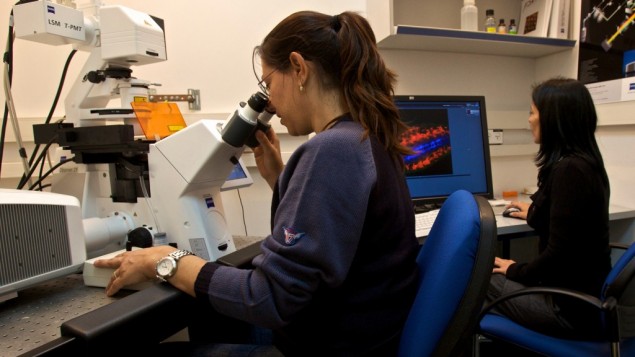
Researchers conduct a study at the Weizmann Institute of Science. Photo credit: Doron Horowitz/Flash90
Scientists have long been aware of the mechanics of epigenetics in the body, in which environmental and other factors affect cells, in a sort of non-genetic “mutation.” As cells divide, they “activate” only the genes that are necessary for their own use, even if they carry the entire gene sequence of a person. But sometimes, proper differentiation of the cells into different types with different functions fails, possibly because of improper molecular “labeling” in a cell. And following this line of research, a team led scientists at the Weizmann Institute have discovered a link between cancer and epigenetic changes.
Epigenetics, which considers the effect of environmental and other factors extraneous to gene code change on a host of human ills and issues, is a relatively unexplored area which could answer many questions that scientists have about how the body works, grows, gets sick, and cures itself. For example, a recent study showed that fathers eating a high-fat diet could pass their overweight tendencies onto their daughters — not by changing the genetic code itself, but by “tweaking” specific genes in a sequence that alter the way those genes are expressed in children.
While in the past the phenomenon of fat parents having fat children might have been chalked up to environmental factors, that study showed that minor chemical changes to genes in a male rat parent, which were thought to be temporary since they did not affect the structure of the genetic code, could be “remembered” and passed down to offspring. The research is preliminary, scientists at several universities that participated in the study said, but the findings were strong enough to warrant further exploration of the phenomenon.
In a recent study, scientists at the Weizmann Institute and a slew of other institutions — including the Technion, Ben-Gurion University, the University of Michigan, and the University of Nice-Sophia Antipolis in France — managed to uncover the details of a step in the process of DNA “repackaging” that takes place during embryonic stem cell differentiation. Stem cells hold great promise as the basis of treatments for many maladies, but they can also be a cause of disease. For example, when self-renewing, unspecialized cells fail to differentiate into diverse cell types, they can start dividing uncontrollably, leading to cancer, something Weizmann scientists discovered decades ago.
But the mechanics of that failure have been unknown, until now — and the answer to the puzzle may lie in epigenetics. Scientists found that in order to differentiate properly, certain pieces of the packaging of their DNA must be labeled by a molecular “tag” called ubiquitin. Such tagging is required for turning on a group of particularly long genes, which enable the stem cell to differentiate. The tagging is either turned “on” or “off” by two enzymes (RNF20 and USP44).
When the tagging process — i.e., the proper formula for cell differentiation — is working properly, the cell does what it is supposed to, regenerating skin or repairing a wound. But when it does not work properly, the result could lead to molecular defects in a cell’s genes — leading to all sorts of “mutative” effects, such as cancer. One sign that this theory may be correct are molecular defects identified in a number of cancers; for example, the abnormally low levels of RNF20 in certain breast and prostate cancers and the excess of USP44 in certain leukemias, the Weizmann study said, adding that “understanding the epigenetic roots of cancer will advance the search for effective therapies for this disease.”
